A proper installation of your HVAC system will benefit you not in just one way but in many different ways. Your HVAC system, apart from maintaining a standard temperature, helps in eliminating many harmful allergens and microorganisms from the air that is outside.
A proper and functional HVAC system will increase the livability of your building to improve the health and quality of life of the people living or working in that space. In case you are not using an HVAC, you must consider getting one installed as a necessity. HVAC systems, just like all other systems, will develop many problems with the passing. To get the most out of your system, you need to get it inspected, maintained, and repaired regularly by proper and certified HVAC experts.
Average Cost of New HVAC System
Commercial HVAC unit cost varies. New HVAC costs are around $1,500 to $12,500. You will have to pay less for single units, or one designed to cool a smaller area. New HVAC unit prices range from $1,000 to $10,000, depending on the size and brand. An air conditioner costs $1,500 to $8,000, while a new furnace runs $1,000 to $4,000.
HVAC System Cost by Types
Residential HVAC system cost
The cost of a residential HVAC system can vary widely based on factors like size, type, efficiency, and installation requirements. On average, the cost typically ranges between $5,000 to $10,000 for a complete system, including both equipment and installation.
However, high-efficiency or larger systems can exceed $15,000. Additional expenses may arise from ductwork modifications, thermostats, or air quality enhancements. Professional assessments and quotes are essential for accurate pricing, as individual home needs greatly impact the final cost
Industrial and Commercial HVAC system cost
You should never forget that one of the major factors that you must take into account when you are buying an HVAC system is its installation cost. It depends on the size of the entire building for which the HVAC system is being installed. Installation can be different for different kinds of buildings.
As we know central air conditioners often come in many different sizes. The larger the air conditioner, the more the installation fee might be. It would never be a good idea to hold back on the HVAC system to save money. Without a fully functional HVAC system, repair costs will add up immediately.
HVAC Systems Installation Cost
HVAC Installation Cost Per Square Foot
If you are someone who is living in a single-level, two-bedroom home, you will have to pay less for your HVAC system as compared to a family that is living in a three-story home that has five bedrooms. Yes, you read it right, the entire HVAC cost per square foot always fluctuates based on the size of the home that you are residing in and in which the HVAC is installed. While few contractors will provide a price quote based on square footage, the average HVAC installation cost per square foot is between $15 to $18.
Commercial HVAC cost per square foot typically averages between $20 to $40. These costs vary based on complexities such as building design, required equipment, and system specifications, reflecting the unique demands of commercial structures.
HVAC Installation Cost of Different Parts
As HVAC would serve both heating and cooling functions, an HVAC is considered a complicated system that is made up of many different parts. Your installation specialist should be able to advise you as to whether you need a complete replacement, or simply a new part for your existing unit. In this case, you could save a lot of money on the cost of replacing an HVAC system. Alturas Contractors has some specialized professionals that can guide you on the replacement of your HVAC system that too in your budget.
Here is a comprehensive breakdown of HVAC system costs for different parts of your home. Generally, HVAC cost per square foot varies for different HVAC systems
Air Conditioner
As we know a central air conditioner will work to keep your whole facility cool as it circulates the air over refrigerated coils. If you have a large facility, they might need individual systems to keep the entire place cool. So, the average cost to install an air conditioner is between $3,350 and $5,910.
Heat Pump
A heat pump is a very important part of your HVAC system. It transfers air from a cooler area to a warmer area with the help of thermal energy. In case you require just a heat pump replaced, expect to pay an average of $4,000 to $8,000. On the other end, a geothermal heat pump can be about five times that price, averaging $15,000 to $35,000. If you install a geothermal system it could save you a great deal of money on heating and cooling costs for many years to come.
Gas Furnace
A gas furnace is a heating system that uses some sort of fuel to heat the entire home or building that you are living in. A gas furnace will cost an average of $1,800 to $4,000 to get replaced.
Oil Furnace
Whereas an oil furnace tends to use oil to heat your home or building. Often, installation of an oil furnace would include more severe work, for instance adding a chimney and an exhaust system to your facility wherever required. Therefore, oil and gas furnaces are often more expensive than electric furnaces. You will see that the average cost to install an oil furnace ranges between $4,200 and $6,900.
Electric Furnace
At an average cost of $1,600 to $2,500, an electric furnace is typically less expensive than a gas or oil furnace.
Related Guide: Step-by-Step Guide to Furnace Installation
Boiler
A boiler usually works to heat your home with the help of hot water that is forced through pipes. It is a more innovative system than a furnace alone and produces comfortable, ambient heat in your facility rather than hot air being projected through heat exhausts. The average cost to install a boiler in your facility is between $1,500 and $3,500.
Duct Work
Ductwork installation costs for homes range from $6 to $19 per square foot. Factors like duct material, size, and complexity affect prices.
Commercial ductwork cost per square foot increases due to larger areas and complex layouts, ranging between $5 to $25 per square foot.
What Factors Affect Commercial HVAC Cost?
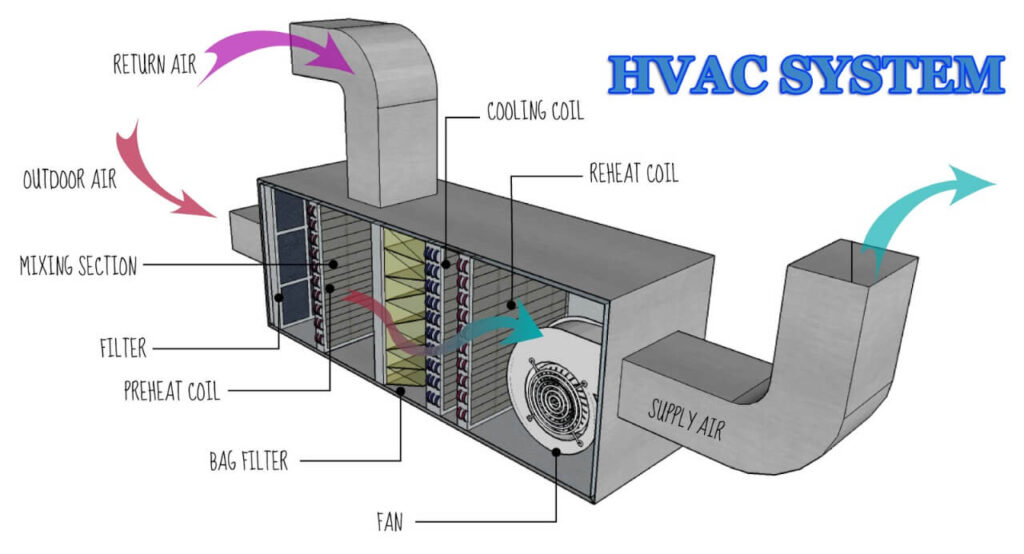
- Type of HVAC Unit
- Labor and HVAC installation costs
- Commercial building size
- Brand
- Type of business/activity
- Location of HVAC system
A lot of HVAC companies team up with some specific equipment manufacturers, which are usually stricter in the residential division. Always remember that commercial HVAC is somehow different because of the variety of equipment that is being used, it can be used for light commercial to major cooling towers and rooftop units for multi-story structures as well.
The Type of HVAC Unit Affects Costs
If you have a small commercial property that is somehow similar to a large house and if you need some sort of packaged units for your apartment building or hotel property, how about cooling towers and massive rooftop units? Well that all depends on what type of HVAC unit you are selecting for your business. Commercial heating and cooling systems usually operate with the help of many different technologies, for instance, variable or constant air volume. Some of them do not use air entirely. We would suggest you have a personal assessment from a trained commercial HVAC specialist to decide the type of HVAC system that is best suited for your commercial property.
Below are the three types of variants that you could choose from
Variable Air Volume (VAV) Systems
VAV commercial HVAC systems are extremely economical. They are somehow similar to those of high-end and energy-efficient HVAC units that you use for your homes. Variable systems usually adjust the amount of airflow that is based on the temperature of the room. They are considered more responsive and can make slight adjustments that are based on variable-speed motors. They are considered more energy-efficient and create more comfort for the inhabitants of that building.
Constant Air Volume (CAV) Systems
CAV systems generally consist of single-split and multi-split systems which is why they are very much common in commercial HVAC systems. Somewhat comparable to residential systems, they also tend to use an indoor air handler or blower that has an outdoor AC compressor as well. They are considered somewhat better for comparatively smaller commercial buildings that have only a few rooms to heat and cool.
Same as single-speed residential systems, CAV systems have two modes: on and off. As a smaller commercial heating and cooling system, they would cost less in the beginning but are also less energy efficient, which means they may cost more to run.
Variable Refrigerant Volume (VRV) Systems
VRV systems are known to flip the entire concept of heating and cooling. They do not push air through the entire building rather they use a system of piping which would allow cool air to circulate. A lot of commercial properties use these systems to heat and cool individual rooms as required.
Labor and HVAC System Installation Costs Vary Extensively
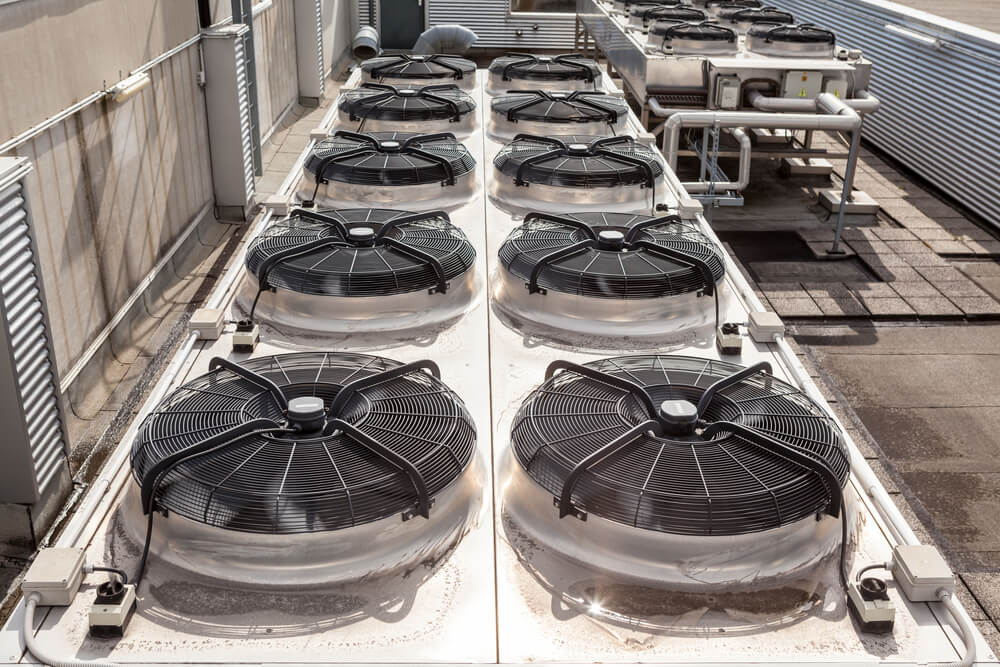
Installation of a commercial HVAC system will always impact the pricing, so you must keep in mind the degree of difficulty that you may face. In case you have a historic building and if you want to install a commercial furnace and an air conditioning system, many special permits will be involved to do anything with these sorts of buildings. As we know older buildings may have tricky architectural elements in which you will have to work and install an HVAC system properly, after all, you would not want to disturb the real architecture of those buildings right? So, ductwork might need to be creative, or it may require supplementary technicalities to manufacture and install.
Commercial Building Size is One of the Biggest Factors for New Commercial HVAC Costs
Same as residential HVAC installations as it is said that bigger is not always better. This is another factor where professional HVAC commercial contractors are vital. You should not buy an air conditioner, for instance, without a commercial HVAC professional performing some suitable calculations. Always keep in mind that your new commercial heating and air conditioning unit should never be too big or too small.
In case it is very big it will cycle too quickly which will cause it to start and stop immediately even before it entirely cools every corner of every room. Moreover, the stress of constant short cycling shortens the HVAC unit’s life span with a lot of wear and tear. All the HVAC systems that are really very large for the provided space also increase the risk of problems just as frozen evaporator coils.
In case the system is very small, it will run constantly, and try to meet unrealistic temperature expectations. You never have to wait for soaring energy bills or shutdown aggravations to realize your new system is the wrong size.
Related: How do you Size a Commercial HVAC System
Here’s a simplistic formula for you to decide on cooling needs by dividing the square footage for the whole building by 500. Then, multiply the answer by 12,000 to estimate how many BTUs central air conditioners should move.
Type of Business or Activity Impacts New Commercial HVAC Estimates
Other major factors include insulation, occupancy as well as activity. The type of insulation will affect the heating and cooling needed from a new commercial HVAC system. Modern and comprehensive insulation retains more BTUs and reduces the heating and cooling load. An office with workers performing light work would have somewhat different requirements than any restaurant that has men and women who are actively on their feet and contains heat-generating equipment.
In general, each human equals 400 BTUs, but activity could skew this higher or lower. Again, this is where a customized plan comes into play.
Brand
Commercial HVAC costs are influenced by factors like brand reputation and quality. Renowned brands often offer higher efficiency and reliability, impacting costs due to premium pricing for their advanced technology and trusted performance.
Location of HVAC system
The placement of AC units varies; while most outdoor components are situated alongside or behind homes, certain properties like condos or shared residences might require rooftop installation, adding around $1,000 to expenses. Difficult access points may raise costs by $100-$200. Concealing units with decorative fencing or accessing challenging areas can increase overall installation costs for homeowners
Repairing Cost of an HVAC System
The cost of repairing an HVAC system typically ranges from $100 to $1,500, depending on the extent of the damage, parts needing replacement, and labor fees. Minor repairs like thermostat replacements or simple component fixes might cost around $100 to $500. However, major repairs such as compressor or motor replacements can incur higher expenses, ranging from $1,000 to $1,500 or more, inclusive of parts and labor charges.
Replacement Costs of HVAC Systems
Nobody would ever want their HVAC system to fail and stop working in any way. But the fact is that your HVACs are very likely to fail when it is either super-hot outside or during the most frigid days of winter. In case your HVAC fails your mind likely immediately turns to replacing it as quickly as possible.
So you might be wondering about the cost of replacing the entire HVAC system in your home.
Conclusion
Well always remember that buying a fully functional HVAC system for both heating and cooling needs can vary in its price. There are a lot of factors that you must consider while deciding which type of HVAC unit to buy and how that will impact the installation fees. As a new, commercial unit may run you a few thousand dollars, but installing it can be difficult. It only depends on how large the building is and the type of space that it provides, HVAC units can be more or less expensive.
A good way to calculate the overall cost of a unit is to assess the type of building that it will ultimately be used for. The entire HVAC system will allow central heating and air conditioning throughout the entire building for maximum comfort and safety. Without a properly working HVAC unit, extreme temperatures can be dangerous for everyone that is there in that building.
Common FAQs About HVAC System Cost
How much does a new commercial air handler cost?
An air handler costs $1,500 to $3,400 to replace, depending on the ton size, brand, and type. Air handler prices are $700 to $1,600 for the unit alone, plus $800 to $1,800 for replacement labor.
What is commercial building HVAC cost per square foot?
For commercial buildings, the HVAC cost per square foot can vary based on the type of building and HVAC system needed:
- Recreational buildings: Typically range between $17 to $22 per square foot for HVAC updates.
- Two-pipe office buildings: Costs can range from $15 to $23 per square foot.
- Four-pipe office buildings: Expect costs between $23 to $28 per square foot for HVAC updates.
- Two-pipe residential: Generally falls within the range of $15 to $18 per square foot.
- Four-pipe residential: Tends to be between $18 to $21 per square foot for HVAC updates.
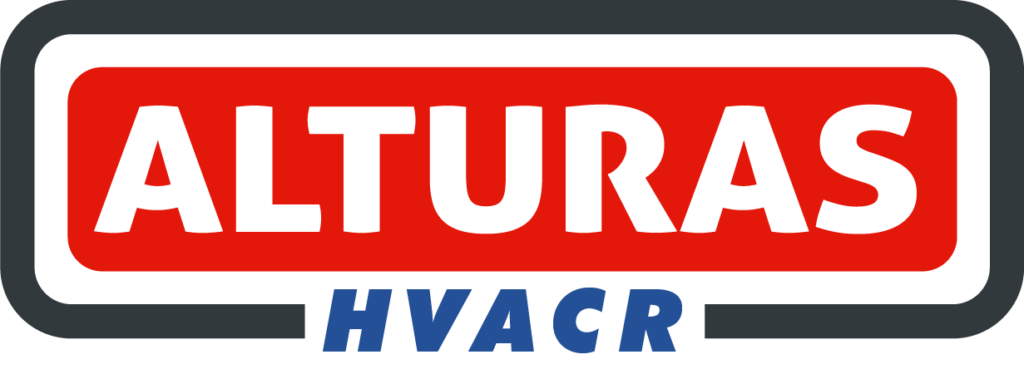
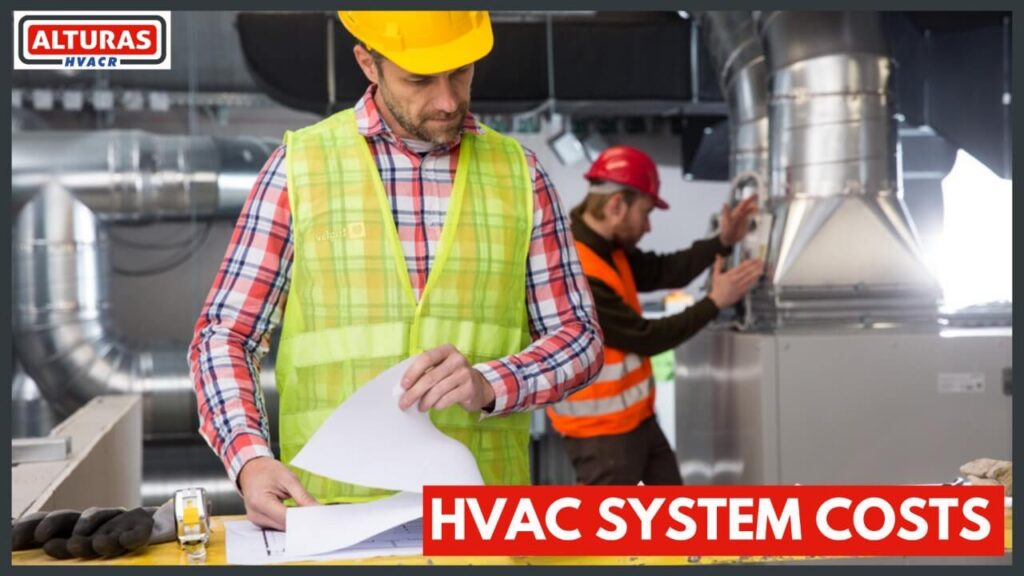
Pingback: Effective strategies for HVAC system design - Alturas Contractors
Pingback: HVAC Basics | Types of Residential HVAC System for homes